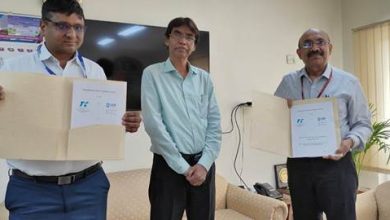MoU signed between DAIC and DICCI to empower SC and ST Communities through research on Dalit Entrepreneurship
New Delhi: In the presence of Shri Thaawarchand Gehlot, Union Minister of Social Justice & Empowerment, a Memorandum of Understanding(MoU) was signed between Dr. Ambedkar International Centre (DAIC), Ministry of Social Justice and Empowerment and Dalit Indian Chamber of Commerce and Industry (DICCI) here today. From DAIC, the Director, Shri Atul Dev Sarmah and from DICCI, Shri Milind Kamble, the Founder Chairman signed the MoU.
Applauding the joint effort of DAIC and DICCI, Shri Gehlot said that the overall motives of this MoU is the empowerment of SC and ST communities through research on Dalit entrepreneurship, empowerment, skill development capacity building among SC/ST women and youth, impact of different schemes of the Government on socio-economic conditions of SC and ST and other similar subjects. He wished them grand success.
Since DICCI brings together all Dalit entrepreneurs under one umbrella, acts as a one-stop Resource Centre for existing and aspiring Dalit entrepreneurs and promotes entrepreneurship among Dalits as a solution to their socio-economic problems. Therefore, DAIC as per its mandate of research in the field of Socio-economic Transformation for capacity building and for preparing and providing policy feed needs collaboration with organisations like DICCI for upliftment of SCs and STs.
DAIC through this collaboration will also try to find out how far the SC and ST communities have engaged themselves in starting and establishing their own businesses. The data will be used to identify the reason why the spirit of entrepreneurship has not been infused among Dalit youth to develop business leadership for empowering them to walk in step with the world.
The main areas of collaboration between DAIC and DICCI are as follows :
- Strengthen the ties between DAIC and Industrial Organisations to make collaborative efforts in the fields of research and training.
- Make joint efforts for creating a knowledge bank which may be used to facilitate scholars, researchers and policy makers.
- Exchange academic materials and publications.
- Conduct lecture programmes, seminars, symposiums, and other types of academic discussions and undertake joint research attachment of staff for purposes of curriculum development and review, attendance of courses, upgrading of teaching and research skills.
- Conducting joint consultancy work.
- Prepare ground for induction of technological knowhow of the industry and administration in academia for better research and policy feeds.
- Prepare a common ground for the industries, institutions, universities, organizations, ministries, research centers and agencies for sponsoring/awarding projects to DAIC and DICCI for activities related to academic and policy research and policy advocacy and capacity building for start-ups and entrepreneurships.
- Both DAIC and DICCI will be having rights on intellectual property and knowledge products created through collaborative efforts.
- Provide free of cost mutual access to facilities available at their campus for purpose of fundamental academic research.
- Participation in experience-sharing and institution-building activities.
- Organize regular capacity building programmes in the form of national-level learning activities. This may, for example, include learning and support services for specialized projects and activities of Indian administration system.
- Training for Indian academics, officers and professionals, especially in the areas of training and learning methodologies, research and policy analysis, administration, social justice and social and financial inclusion.
- Research collaboration on emerging skill development and employment relations themes.
- Development of innovative learning platforms and education programmes with emphasis on low residency and learning at distance for workers and adult learners.



